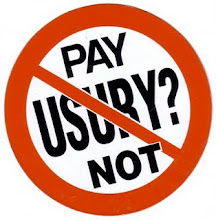Usury and the Collapse of Empires

By Daniel Lemire
"The American government recently played Russian roulette with its economy by threatening to default on its debt. Of course, nobody actually thought that the Americans would truly default at this time. After all, the Americans can quite literally print dollars to pay their debt. But it is also possible that the USA has entered a state of decline: massive public and private debts without growth quickly leads to collapse.
While it is a cliché, I am fascinated by the analogy between the American superpower and the fall of the Roman Empire. The economics of the Roman Empire during its decline bear some similarity to our current situation.
Rome partially moved away from a gold-based currency some time during its decline. It started to mint coins with less gold content. Similarly, the Americans switched to a fiat currency in the seventies under Nixon. The American government no longer guarantees a gold equivalent for the American dollar. In both cases, the currency became backed by the great economical and military power of the government. Unfortunately, this type of backing loses its efficiency when a decline is hinted. Your dollars are only valuable if you think that the USA will keep growing stronger. If you think that the American economy might suffer on the long term, then American dollars are much less interesting. Thus, predictions of decline become self-fulfilling.
During the fall of the Roman Empire, many citizens were enticed to borrow from the super wealthy. Eventually, the peasant class was wiped out: they became serfs. Serfs live in conditions where they cannot possibly expect to improve their conditions. They constantly owe more than they earn. They are, effectively, slaves.
The Catholic Church, which emerged at the time, correspondingly considered usury to be a sin. While it seems that the stance of the Catholic Church on usury is quite a bit more flexible today, religions like Islam still forbid usury. Judaism only allows usury toward non-Jews.
What is usury? Lending money knowing that it will make people poorer. Correspondingly, most consumer debt is usury. It is a transfer of wealth from the poor to the rich which makes us, overall, poorer. Lending money to Greece at this time is also usury.
Could the religious stance against usury be wise?
Economists who expect people to be rational won’t believe in usury. Surely, people borrow money to be better off. Yet the average credit card debt per household is over $15,000 in the USA (and it grows all the time, of course). Does anyone believe that these $15,000 are invested in highly profitable ventures? (They would need to be highly profitable since credit cards often charge over 15% for loans.)
Conclusion: This is meant to be a lighthearted commentary. I am an amateur economist. But can anyone convince me that credit card companies produce wealth by charging exorbitant interests to people who use the money to buy beer and chips? When more and more of our economy is based on such usury, is it not a sign of decline? Won’t the American peasants become serfs at this rate?
Note: 45 million of Americans are dependent on government food stamps. According to Business Insider, credit card debt is growing much faster than the median household income. Despite massive defaults on mortgages between 2007 and 2010, consumer debt has remained stable." (snip)....
NOTE: This article is originally published at this website:
http://lemire.me/blog/archives/2011/08/09/usury-and-the-collapse-of-empires


0 Comments:
Post a Comment
<< Home